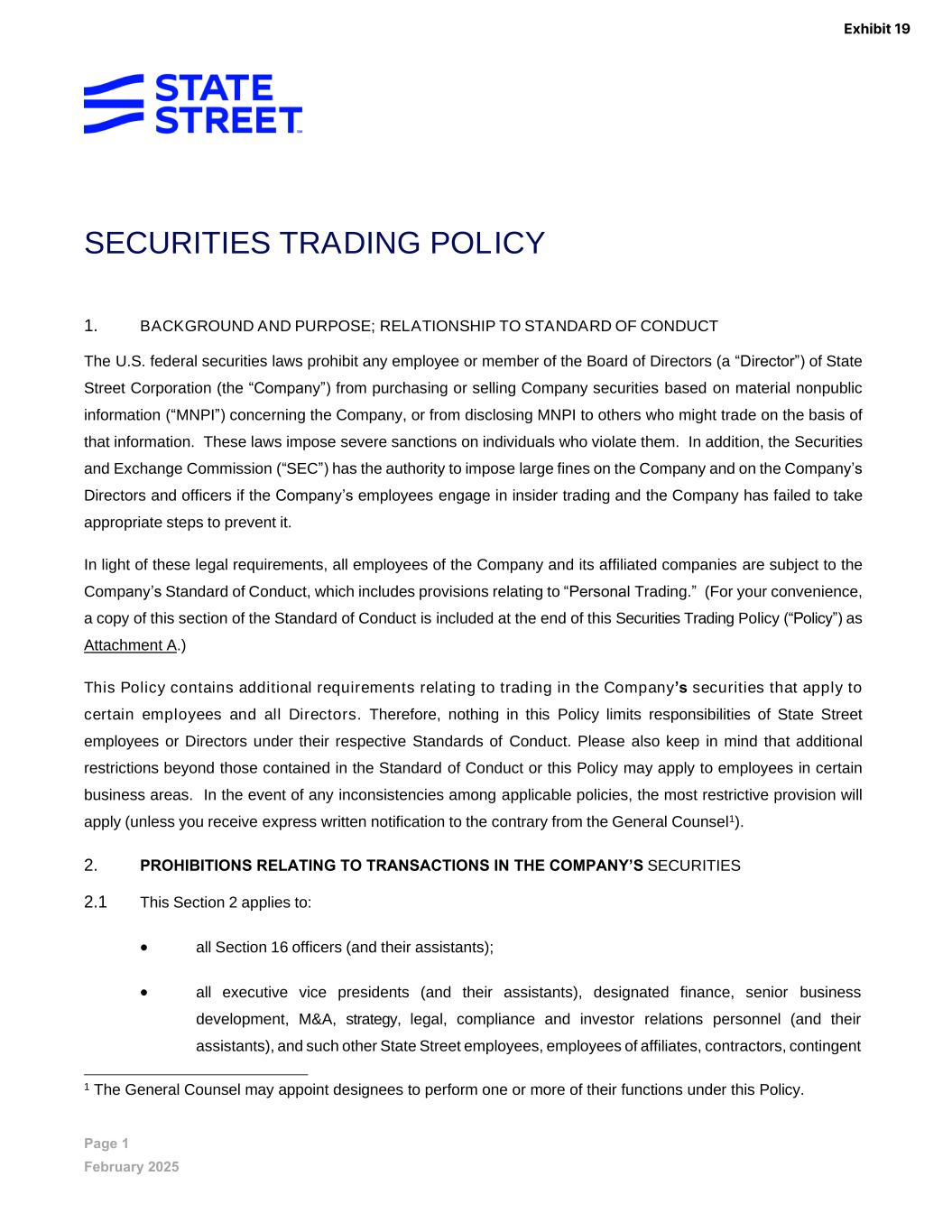
Page 1 February 2025 SECURITIES TRADING POLICY 1. BACKGROUND AND PURPOSE; RELATIONSHIP TO STANDARD OF CONDUCT The U.S. federal securities laws prohibit any employee or member of the Board of Directors (a “Director”) of State Street Corporation (the “Company”) from purchasing or selling Company securities based on material nonpublic information (“MNPI”) concerning the Company, or from disclosing MNPI to others who might trade on the basis of that information. These laws impose severe sanctions on individuals who violate them. In addition, the Securities and Exchange Commission (“SEC”) has the authority to impose large fines on the Company and on the Company’s Directors and officers if the Company’s employees engage in insider trading and the Company has failed to take appropriate steps to prevent it. In light of these legal requirements, all employees of the Company and its affiliated companies are subject to the Company’s Standard of Conduct, which includes provisions relating to “Personal Trading.” (For your convenience, a copy of this section of the Standard of Conduct is included at the end of this Securities Trading Policy (“Policy”) as Attachment A.) This Policy contains additional requirements relating to trading in the Company’s securities that apply to certain employees and all Directors. Therefore, nothing in this Policy limits responsibilities of State Street employees or Directors under their respective Standards of Conduct. Please also keep in mind that additional restrictions beyond those contained in the Standard of Conduct or this Policy may apply to employees in certain business areas. In the event of any inconsistencies among applicable policies, the most restrictive provision will apply (unless you receive express written notification to the contrary from the General Counsel1). 2. PROHIBITIONS RELATING TO TRANSACTIONS IN THE COMPANY’S SECURITIES 2.1 This Section 2 applies to: • all Section 16 officers (and their assistants); • all executive vice presidents (and their assistants), designated finance, senior business development, M&A, strategy, legal, compliance and investor relations personnel (and their assistants), and such other State Street employees, employees of affiliates, contractors, contingent 1 The General Counsel may appoint designees to perform one or more of their functions under this Policy. Exhibit 19
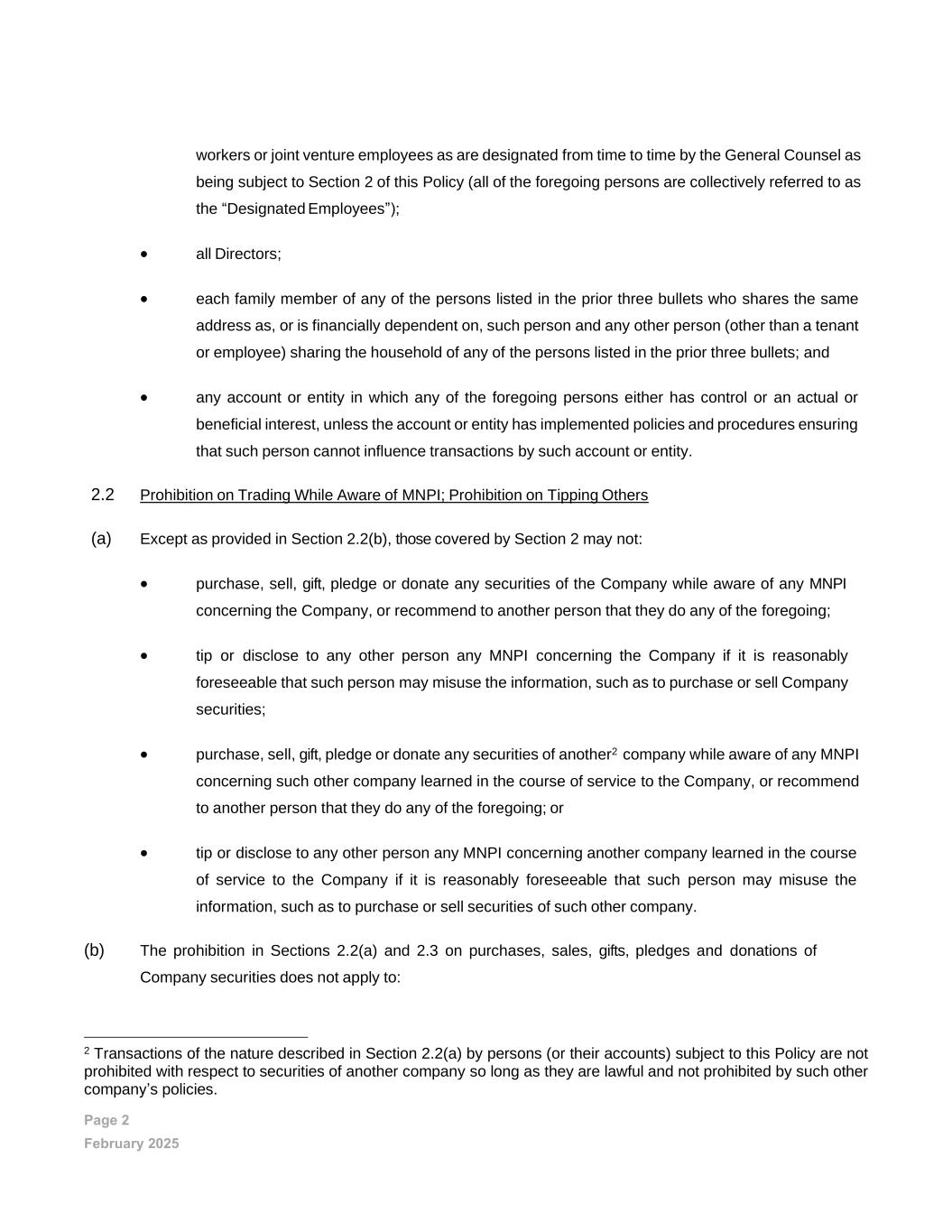
Page 2 February 2025 workers or joint venture employees as are designated from time to time by the General Counsel as being subject to Section 2 of this Policy (all of the foregoing persons are collectively referred to as the “Designated Employees”); • all Directors; • each family member of any of the persons listed in the prior three bullets who shares the same address as, or is financially dependent on, such person and any other person (other than a tenant or employee) sharing the household of any of the persons listed in the prior three bullets; and • any account or entity in which any of the foregoing persons either has control or an actual or beneficial interest, unless the account or entity has implemented policies and procedures ensuring that such person cannot influence transactions by such account or entity. 2.2 Prohibition on Trading While Aware of MNPI; Prohibition on Tipping Others (a) Except as provided in Section 2.2(b), those covered by Section 2 may not: • purchase, sell, gift, pledge or donate any securities of the Company while aware of any MNPI concerning the Company, or recommend to another person that they do any of the foregoing; • tip or disclose to any other person any MNPI concerning the Company if it is reasonably foreseeable that such person may misuse the information, such as to purchase or sell Company securities; • purchase, sell, gift, pledge or donate any securities of another2 company while aware of any MNPI concerning such other company learned in the course of service to the Company, or recommend to another person that they do any of the foregoing; or • tip or disclose to any other person any MNPI concerning another company learned in the course of service to the Company if it is reasonably foreseeable that such person may misuse the information, such as to purchase or sell securities of such other company. (b) The prohibition in Sections 2.2(a) and 2.3 on purchases, sales, gifts, pledges and donations of Company securities does not apply to: 2 Transactions of the nature described in Section 2.2(a) by persons (or their accounts) subject to this Policy are not prohibited with respect to securities of another company so long as they are lawful and not prohibited by such other company’s policies.

Page 3 February 2025 SECURITIES TRADING POLICY • cash exercises of employee or Director stock options that are scheduled to expire within 30 days; provided, however, that the securities so acquired may not be sold (either outright or in connection with a “cashless” exercise transaction through a broker) while the employee or Director is aware of MNPI or during a corporate news blackout period (as defined in Section 2.3); • acquisitions or dispositions of Company common stock under the Company’s 401(k) or other individual account plan that are made pursuant to standing instructions not entered into or modified while the employee or Director is aware of MNPI or during a corporate news blackout period; • other option exercises and purchases of securities from the Company or sales or pledges of securities to the Company that are approved by the General Counsel; • gratuitous transfers by a person subject to this Policy that are approved in advance by the General Counsel; and • purchases, sales or gifts made pursuant to a binding contract, written plan or specific instruction (a “Rule 10b5-1 Trading Plan”) that is adopted and satisfies the applicable affirmative defense conditions of Rule 10b5-1 under the Securities Exchange Act of 1934, as amended (the “Exchange Act”), including the ongoing requirement to act in good faith with respect to the Rule10b5-1 Trading Plan during its duration, provided such Rule 10b5-1 Trading Plan: (1) is in writing; (2) was submitted to the Company for acknowledgement prior to its adoption; (3) was adopted in good faith, outside of any applicable blackout period, and at a time when the individual adopting the plan does not possess MNPI about the Company; (4) includes an initial cooling-off period; and (5) was otherwise adopted in accordance with applicable Company Rule 10b5-1 Trading Plan practices from time to time in effect, including providing to the Company requested certifications as to compliance with Rule 10b5-1 and related matters. 2.3 Prohibition on Sales During Corporate News Blackout Periods (a) Except as provided in Section 2.2(b), no person covered by Section 2 may purchase, sell, gift, pledge or donate any securities of the Company during the following time periods (each, a “corporate news blackout period”): • beginning the first trading day of the last month of each fiscal quarter and ending upon the
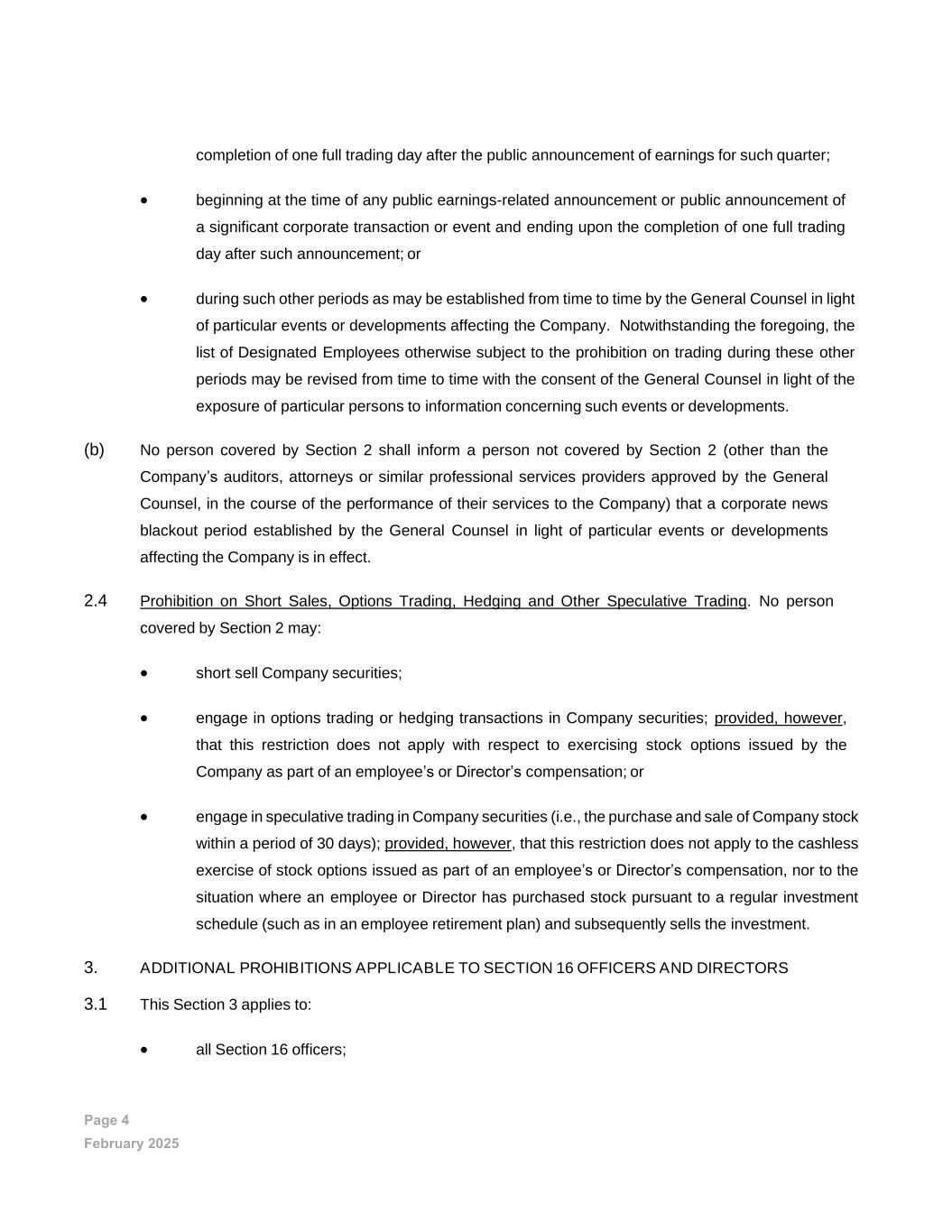
Page 4 February 2025 completion of one full trading day after the public announcement of earnings for such quarter; • beginning at the time of any public earnings-related announcement or public announcement of a significant corporate transaction or event and ending upon the completion of one full trading day after such announcement; or • during such other periods as may be established from time to time by the General Counsel in light of particular events or developments affecting the Company. Notwithstanding the foregoing, the list of Designated Employees otherwise subject to the prohibition on trading during these other periods may be revised from time to time with the consent of the General Counsel in light of the exposure of particular persons to information concerning such events or developments. (b) No person covered by Section 2 shall inform a person not covered by Section 2 (other than the Company’s auditors, attorneys or similar professional services providers approved by the General Counsel, in the course of the performance of their services to the Company) that a corporate news blackout period established by the General Counsel in light of particular events or developments affecting the Company is in effect. 2.4 Prohibition on Short Sales, Options Trading, Hedging and Other Speculative Trading. No person covered by Section 2 may: • short sell Company securities; • engage in options trading or hedging transactions in Company securities; provided, however, that this restriction does not apply with respect to exercising stock options issued by the Company as part of an employee’s or Director’s compensation; or • engage in speculative trading in Company securities (i.e., the purchase and sale of Company stock within a period of 30 days); provided, however, that this restriction does not apply to the cashless exercise of stock options issued as part of an employee’s or Director’s compensation, nor to the situation where an employee or Director has purchased stock pursuant to a regular investment schedule (such as in an employee retirement plan) and subsequently sells the investment. 3. ADDITIONAL PROHIBITIONS APPLICABLE TO SECTION 16 OFFICERS AND DIRECTORS 3.1 This Section 3 applies to: • all Section 16 officers;
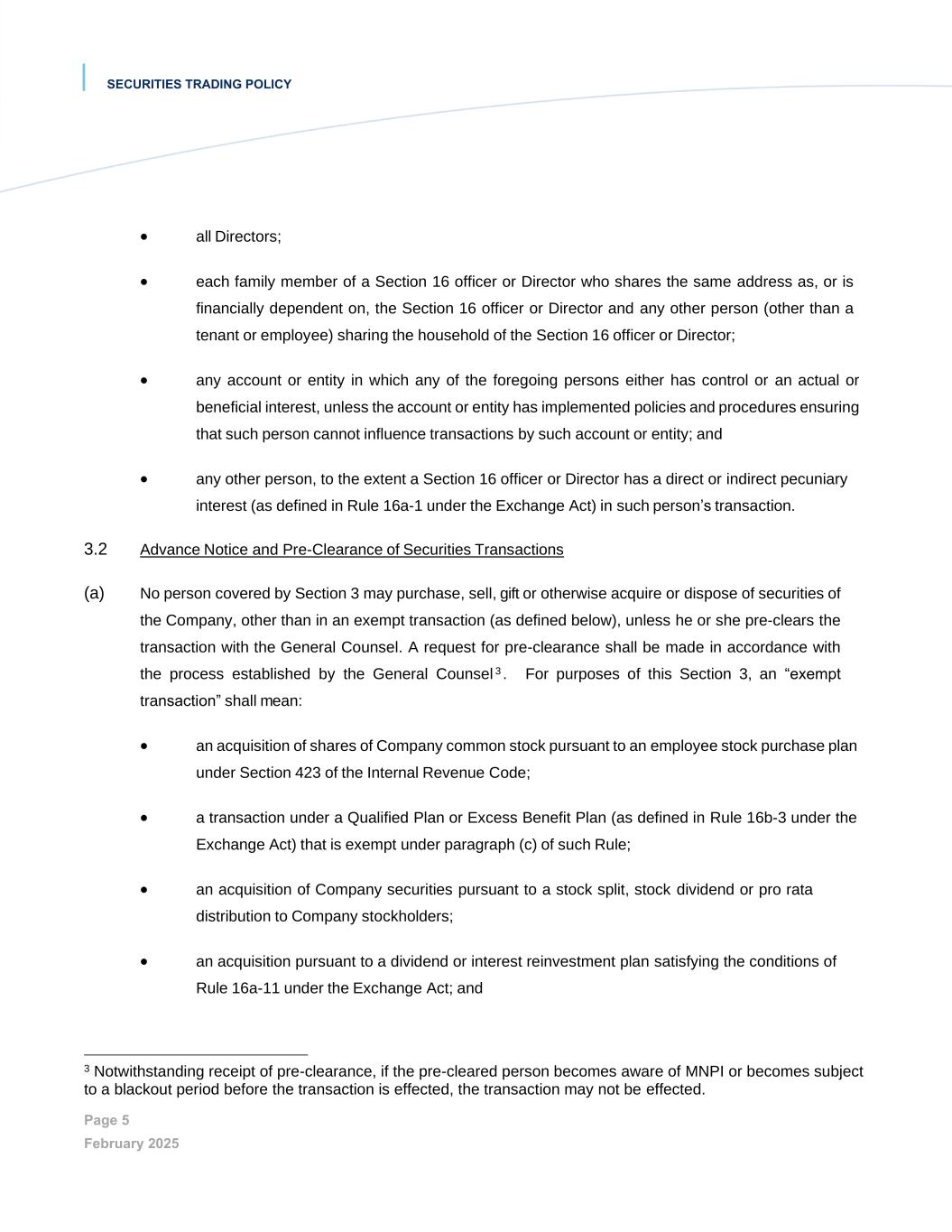
Page 5 February 2025 SECURITIES TRADING POLICY • all Directors; • each family member of a Section 16 officer or Director who shares the same address as, or is financially dependent on, the Section 16 officer or Director and any other person (other than a tenant or employee) sharing the household of the Section 16 officer or Director; • any account or entity in which any of the foregoing persons either has control or an actual or beneficial interest, unless the account or entity has implemented policies and procedures ensuring that such person cannot influence transactions by such account or entity; and • any other person, to the extent a Section 16 officer or Director has a direct or indirect pecuniary interest (as defined in Rule 16a-1 under the Exchange Act) in such person’s transaction. 3.2 Advance Notice and Pre-Clearance of Securities Transactions (a) No person covered by Section 3 may purchase, sell, gift or otherwise acquire or dispose of securities of the Company, other than in an exempt transaction (as defined below), unless he or she pre-clears the transaction with the General Counsel. A request for pre-clearance shall be made in accordance with the process established by the General Counsel 3 . For purposes of this Section 3, an “exempt transaction” shall mean: • an acquisition of shares of Company common stock pursuant to an employee stock purchase plan under Section 423 of the Internal Revenue Code; • a transaction under a Qualified Plan or Excess Benefit Plan (as defined in Rule 16b-3 under the Exchange Act) that is exempt under paragraph (c) of such Rule; • an acquisition of Company securities pursuant to a stock split, stock dividend or pro rata distribution to Company stockholders; • an acquisition pursuant to a dividend or interest reinvestment plan satisfying the conditions of Rule 16a-11 under the Exchange Act; and 3 Notwithstanding receipt of pre-clearance, if the pre-cleared person becomes aware of MNPI or becomes subject to a blackout period before the transaction is effected, the transaction may not be effected.
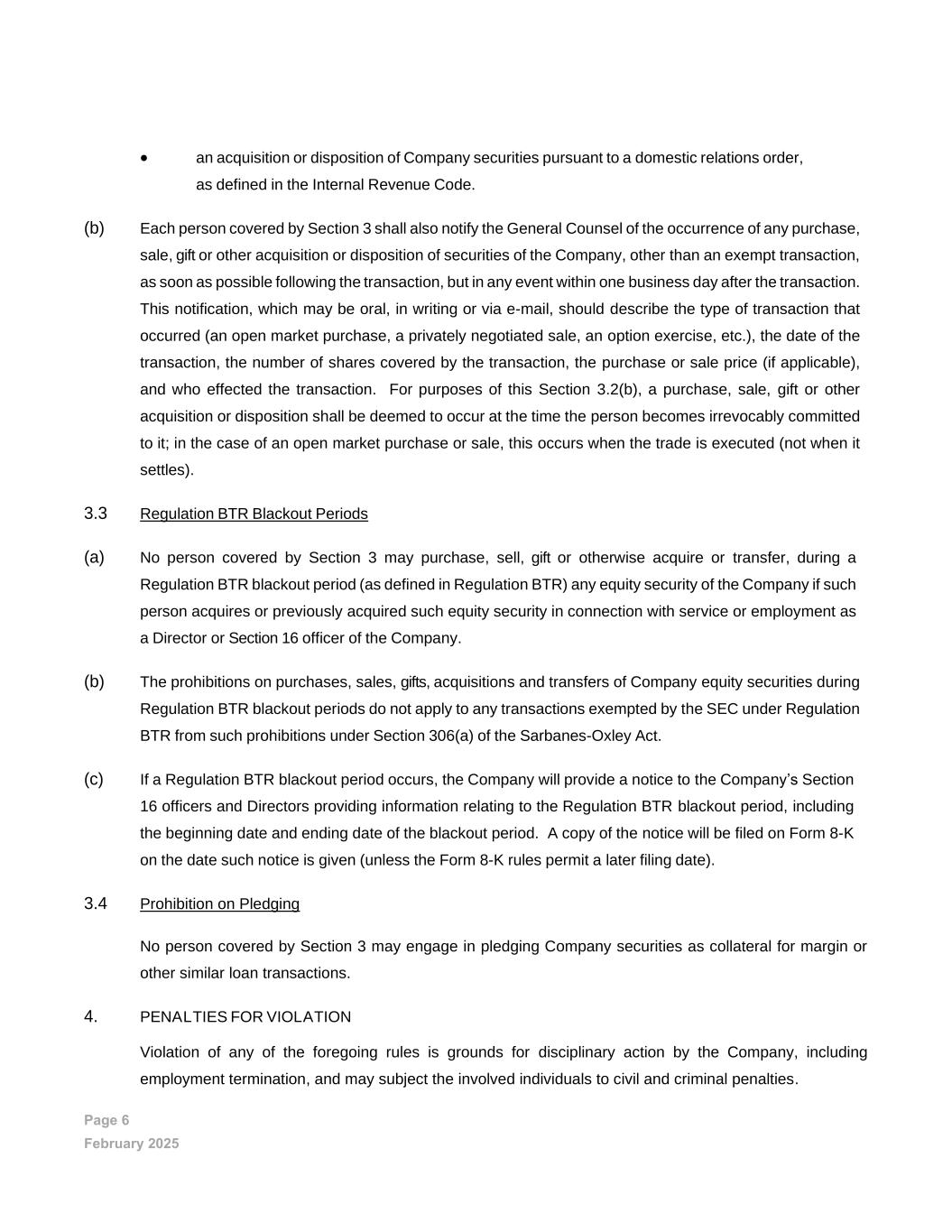
Page 6 February 2025 • an acquisition or disposition of Company securities pursuant to a domestic relations order, as defined in the Internal Revenue Code. (b) Each person covered by Section 3 shall also notify the General Counsel of the occurrence of any purchase, sale, gift or other acquisition or disposition of securities of the Company, other than an exempt transaction, as soon as possible following the transaction, but in any event within one business day after the transaction. This notification, which may be oral, in writing or via e-mail, should describe the type of transaction that occurred (an open market purchase, a privately negotiated sale, an option exercise, etc.), the date of the transaction, the number of shares covered by the transaction, the purchase or sale price (if applicable), and who effected the transaction. For purposes of this Section 3.2(b), a purchase, sale, gift or other acquisition or disposition shall be deemed to occur at the time the person becomes irrevocably committed to it; in the case of an open market purchase or sale, this occurs when the trade is executed (not when it settles). 3.3 Regulation BTR Blackout Periods (a) No person covered by Section 3 may purchase, sell, gift or otherwise acquire or transfer, during a Regulation BTR blackout period (as defined in Regulation BTR) any equity security of the Company if such person acquires or previously acquired such equity security in connection with service or employment as a Director or Section 16 officer of the Company. (b) The prohibitions on purchases, sales, gifts, acquisitions and transfers of Company equity securities during Regulation BTR blackout periods do not apply to any transactions exempted by the SEC under Regulation BTR from such prohibitions under Section 306(a) of the Sarbanes-Oxley Act. (c) If a Regulation BTR blackout period occurs, the Company will provide a notice to the Company’s Section 16 officers and Directors providing information relating to the Regulation BTR blackout period, including the beginning date and ending date of the blackout period. A copy of the notice will be filed on Form 8-K on the date such notice is given (unless the Form 8-K rules permit a later filing date). 3.4 Prohibition on Pledging No person covered by Section 3 may engage in pledging Company securities as collateral for margin or other similar loan transactions. 4. PENALTIES FOR VIOLATION Violation of any of the foregoing rules is grounds for disciplinary action by the Company, including employment termination, and may subject the involved individuals to civil and criminal penalties.
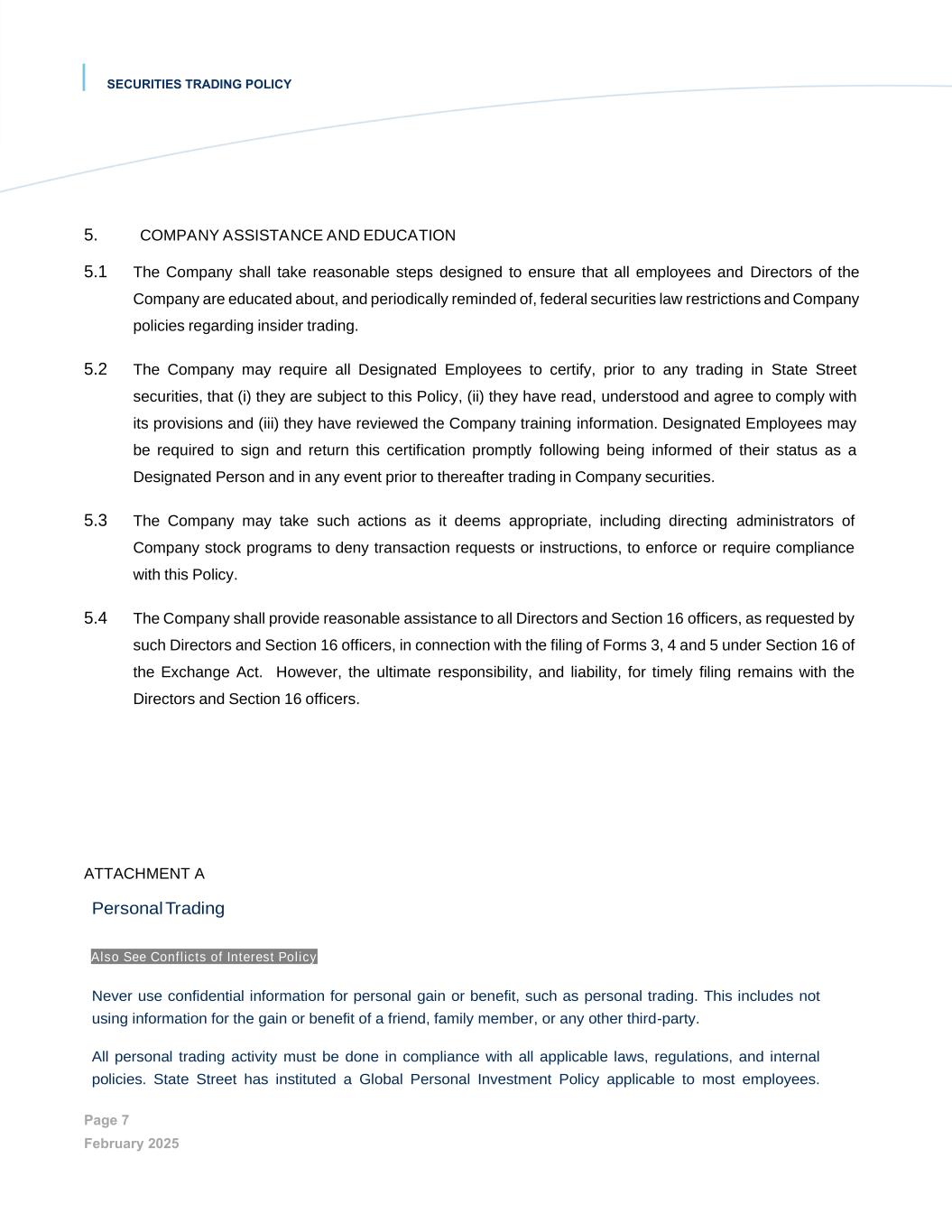
Page 7 February 2025 SECURITIES TRADING POLICY 5. COMPANY ASSISTANCE AND EDUCATION 5.1 The Company shall take reasonable steps designed to ensure that all employees and Directors of the Company are educated about, and periodically reminded of, federal securities law restrictions and Company policies regarding insider trading. 5.2 The Company may require all Designated Employees to certify, prior to any trading in State Street securities, that (i) they are subject to this Policy, (ii) they have read, understood and agree to comply with its provisions and (iii) they have reviewed the Company training information. Designated Employees may be required to sign and return this certification promptly following being informed of their status as a Designated Person and in any event prior to thereafter trading in Company securities. 5.3 The Company may take such actions as it deems appropriate, including directing administrators of Company stock programs to deny transaction requests or instructions, to enforce or require compliance with this Policy. 5.4 The Company shall provide reasonable assistance to all Directors and Section 16 officers, as requested by such Directors and Section 16 officers, in connection with the filing of Forms 3, 4 and 5 under Section 16 of the Exchange Act. However, the ultimate responsibility, and liability, for timely filing remains with the Directors and Section 16 officers. ATTACHMENT A Personal Trading Also See Conflicts of Interest Policy Never use confidential information for personal gain or benefit, such as personal trading. This includes not using information for the gain or benefit of a friend, family member, or any other third-party. All personal trading activity must be done in compliance with all applicable laws, regulations, and internal policies. State Street has instituted a Global Personal Investment Policy applicable to most employees.
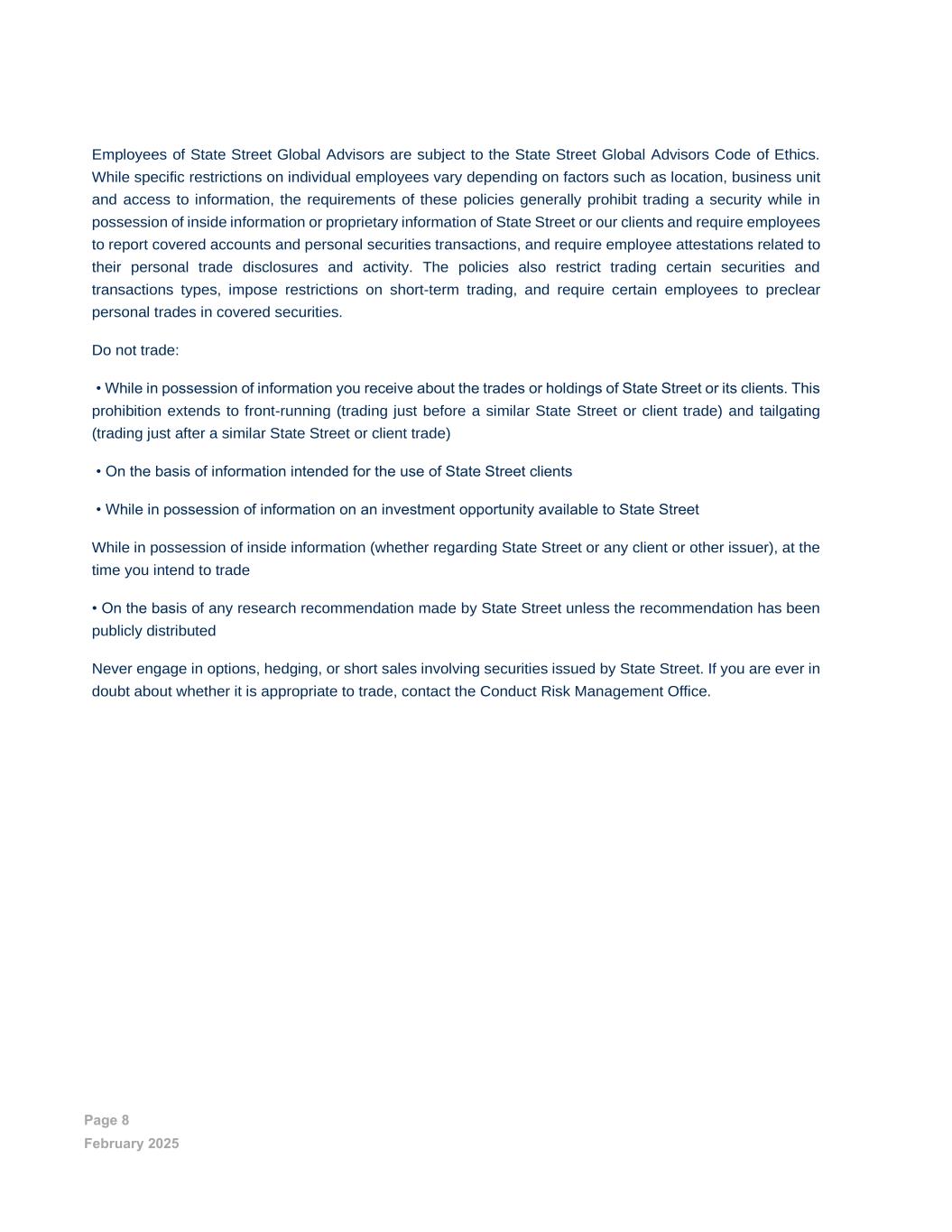
Page 8 February 2025 Employees of State Street Global Advisors are subject to the State Street Global Advisors Code of Ethics. While specific restrictions on individual employees vary depending on factors such as location, business unit and access to information, the requirements of these policies generally prohibit trading a security while in possession of inside information or proprietary information of State Street or our clients and require employees to report covered accounts and personal securities transactions, and require employee attestations related to their personal trade disclosures and activity. The policies also restrict trading certain securities and transactions types, impose restrictions on short-term trading, and require certain employees to preclear personal trades in covered securities. Do not trade: • While in possession of information you receive about the trades or holdings of State Street or its clients. This prohibition extends to front-running (trading just before a similar State Street or client trade) and tailgating (trading just after a similar State Street or client trade) • On the basis of information intended for the use of State Street clients • While in possession of information on an investment opportunity available to State Street While in possession of inside information (whether regarding State Street or any client or other issuer), at the time you intend to trade • On the basis of any research recommendation made by State Street unless the recommendation has been publicly distributed Never engage in options, hedging, or short sales involving securities issued by State Street. If you are ever in doubt about whether it is appropriate to trade, contact the Conduct Risk Management Office.







